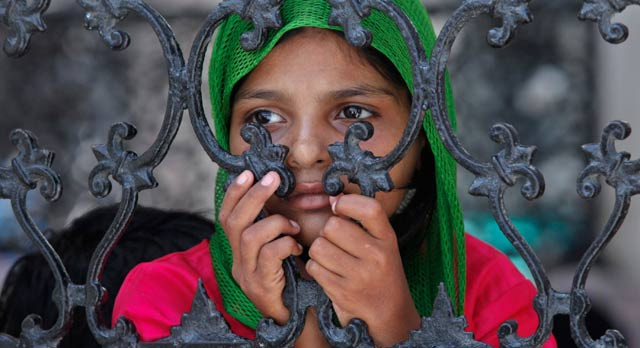New pro-women laws a step in right direction: Sughra
The senator was the author and mover of both the anti-honour killing and anti-rape bills

PHOTO: REUTERS
Genuinely outraged, she, too, is in a dilemma. In the same gathering at this representative’s ‘dera’ are some other members of the same family and relatives, pleading the mother to pardon the culprit.
The public representative herself a woman, backs the mother and asks her to let the law take its course and the mother stays the course. A few months later, the public representative comes to know the hapless mother capitulated under family pressure and ‘forgave’ the perpetrator – her son who had killed his sister in the name of ‘honour’.
Such cases are commonplace; in most cases, the whole family is accomplice to the crime, says Sugra Imam who encounters such cases in her constituency. The plight of this destitute mother and many others she dealt with, made her realise the loopholes in extant laws.
Former Senator Sughra Imam authored and tabled both legislations; the anti-honour killing and anti-rape bills passed unanimously during the joint sitting of both Houses last week.
She also has the distinction of having four private member’s bills passed by the parliament – a record achievement for any legislator.
All these bills were passed by the Senate before Sughra’s term as a Senator expired last year. They lapsed in the National Assembly. One of her senior colleagues Farhatullah Babar of the PPP also deserves accolades for persistently pursuing Sughra’s bills. The pair made good use of parliamentary instrument that allows taking up before the joint session any legislation that was adopted in one house but lapsed in the other.
Sughra also shares her success with the government, particularly federal law minister Zahid Hamid for bringing up her bills on the agenda of the joint sitting where everyone voted in their favour. Tagged the Criminal Law (Amendment) (Offences in the name or on the pretext of Honor) Bill, 2016, it is aimed at preventing the killing of women in the name of ‘honor’ by making it a non-compoundable offence.
It prescribes tougher punishments than ordinary murder cases. The honor killing convicts will have to face a maximum prison term of 25 years even if relatives of the victims struck an agreement with the convict and pardoned them. However, they can play a vital part in pardoning the death sentence.
Existing laws allowed murderers to be released after legal heirs pardoned them.
The new anti-rape law, the Criminal Law (Amendment) (Offences Relating to Rape) Bill, 2016, added some new provisions, including provision for conducting DNA tests on both the alleged victim and perpetrator. Rape of minors, as well as the mentally- and physically-ill, would become punishable by death.
Law-enforcers or policemen would also face imprisonment if their negligence or biased approach was proved during investigation of such cases.
The former senator, who normally avoids media attention, in an interview with The Express Tribune termed passing of both the bills culmination of her life-long struggle. During public dealing as young legislator first as district nazim and then as member of the Punjab Assembly from 2002-08, before she was elected Senator in 2009, she encountered many such cases. She felt the need for delineating stricter laws to discourage the increasing trend for these menaces in the society.
“I can still recall those people… that mother, and (other) close relatives and some others from the same clan. They were perfectly aware that the killer will be set free because the complainant was the mother,” she said.
In this particular case, she said, the mother appeared genuinely outraged, but in the end, she succumbed to peer pressure after some time.
“There were cases where the whole family was involved. One such case was brought before me,” she said.
The accused and victim in honour killing cases are from the same family and tend to forgive each other hence there are hardly any convictions.
Sughra said she realised there were loopholes in the law which, were exploited to allow miscarriage of justice in most murders committed in the name of ‘honour’.
“They kill with impunity because they know they will pay no price. The law was not proving any deterrent at all,” she remarked.
The newly passed anti-honour killing law, is the amended version of Sughra’s draft. She had proposed making the offence non-compoundable, including the death penalty. She calls the amended version still a step in the right direction.
“In due course as the new amendment is implemented we will see its impact and then we can assess whether it has the desired deterrent effect. If not, legislation is a dynamic process and it can be improved,” she said.
She also rejoices the passing of her other bill -- the anti rape law. It is a step towards moving away from circumstantial evidence towards empirical evidence, helping rape victims get justice, she said. According to her, existing laws relied heavily on circumstantial evidence to prove rape cases, resulting in negligible conviction rate.
Her two other bills, adopted in a similar manner during the previous joint sitting of the parliament, dealt with conflict of interest.
The Civil Service Amendment Bill, bars civil servants to take another job with any international organisation or donor while in service. The other was privatization commission amendment bill binding the commission members to have post-transaction audit of privatization needs.
She had moved also another bill that proposed a bar on dual nationals on joining civil service, judiciary or the armed forces. The bill was dropped at the nascent stage.
Published in The Express Tribune, October 10th, 2016.



















COMMENTS
Comments are moderated and generally will be posted if they are on-topic and not abusive.
For more information, please see our Comments FAQ